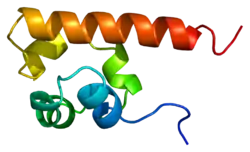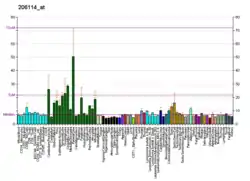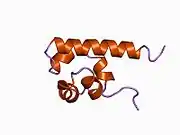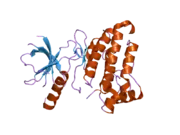EPH receptor A4
EPH receptor A4 (ephrin type-A receptor 4) is a protein that in humans is encoded by the EPHA4 gene.[5][6]
This gene belongs to the ephrin receptor subfamily of the protein-tyrosine kinase family. EPH and EPH-related receptors have been implicated in mediating developmental events, particularly in the nervous system. Receptors in the EPH subfamily typically have a single kinase domain and an extracellular region containing a Cys-rich domain and 2 fibronectin type III repeats. The ephrin receptors are divided into 2 groups based on the similarity of their extracellular domain sequences and their affinities for binding ephrin-A and ephrin-B ligands.[6]
In 2012, a publication in Nature Medicine revealed a connection between EPHA4 and the neurodegenerative disease Amyotrophic lateral sclerosis (ALS), where a defective gene allows ALS patients to live considerably longer than patients with an intact gene. This opens up for development of treatment for this currently untreatable disease.
References
- GRCh38: Ensembl release 89: ENSG00000116106 - Ensembl, May 2017
- GRCm38: Ensembl release 89: ENSMUSG00000026235 - Ensembl, May 2017
- "Human PubMed Reference:". National Center for Biotechnology Information, U.S. National Library of Medicine.
- "Mouse PubMed Reference:". National Center for Biotechnology Information, U.S. National Library of Medicine.
- Ephnomenclaturecommittee (Sep 1997). "Unified nomenclature for Eph family receptors and their ligands, the ephrins. Eph Nomenclature Committee". Cell. 90 (3): 403–4. doi:10.1016/S0092-8674(00)80500-0. PMID 9267020. S2CID 26773768.
- "Entrez Gene: EPHA4 EPH receptor A4".
Further reading
- Flanagan JG, Vanderhaeghen P (1998). "The ephrins and Eph receptors in neural development". Annu. Rev. Neurosci. 21: 309–45. doi:10.1146/annurev.neuro.21.1.309. PMID 9530499.
- Zhou R (1998). "The Eph family receptors and ligands". Pharmacol. Ther. 77 (3): 151–81. doi:10.1016/S0163-7258(97)00112-5. PMID 9576626.
- Holder N, Klein R (1999). "Eph receptors and ephrins: effectors of morphogenesis". Development. 126 (10): 2033–44. PMID 10207129.
- Wilkinson DG (2000). "Eph receptors and ephrins: regulators of guidance and assembly; Chapter: Eph receptors and ephrins: Regulators of guidance and assembly". Int. Rev. Cytol. International Review of Cytology. 196: 177–244. doi:10.1016/S0074-7696(00)96005-4. ISBN 978-0-12-364600-2. PMID 10730216.
- Xu Q, Mellitzer G, Wilkinson DG (2001). "Roles of Eph receptors and ephrins in segmental patterning". Philos. Trans. R. Soc. Lond. B Biol. Sci. 355 (1399): 993–1002. doi:10.1098/rstb.2000.0635. PMC 1692797. PMID 11128993.
- Wilkinson DG (2001). "Multiple roles of EPH receptors and ephrins in neural development". Nat. Rev. Neurosci. 2 (3): 155–64. doi:10.1038/35058515. PMID 11256076. S2CID 205014301.
- Fox GM, Holst PL, Chute HT, et al. (1995). "cDNA cloning and tissue distribution of five human EPH-like receptor protein-tyrosine kinases". Oncogene. 10 (5): 897–905. PMID 7898931.
- Maruyama K, Sugano S (1994). "Oligo-capping: a simple method to replace the cap structure of eukaryotic mRNAs with oligoribonucleotides". Gene. 138 (1–2): 171–4. doi:10.1016/0378-1119(94)90802-8. PMID 8125298.
- Ellis C, Kasmi F, Ganju P, et al. (1996). "A juxtamembrane autophosphorylation site in the Eph family receptor tyrosine kinase, Sek, mediates high affinity interaction with p59fyn". Oncogene. 12 (8): 1727–36. PMID 8622893.
- Gale NW, Holland SJ, Valenzuela DM, et al. (1996). "Eph receptors and ligands comprise two major specificity subclasses and are reciprocally compartmentalized during embryogenesis". Neuron. 17 (1): 9–19. doi:10.1016/S0896-6273(00)80276-7. PMID 8755474. S2CID 1075856.
- Bonaldo MF, Lennon G, Soares MB (1997). "Normalization and subtraction: two approaches to facilitate gene discovery". Genome Res. 6 (9): 791–806. doi:10.1101/gr.6.9.791. PMID 8889548.
- Aasheim HC, Terstappen LW, Logtenberg T (1997). "Regulated expression of the Eph-related receptor tyrosine kinase Hek11 in early human B lymphopoiesis". Blood. 90 (9): 3613–22. doi:10.1182/blood.V90.9.3613. PMID 9345045.
- Suzuki Y, Yoshitomo-Nakagawa K, Maruyama K, et al. (1997). "Construction and characterization of a full length-enriched and a 5'-end-enriched cDNA library". Gene. 200 (1–2): 149–56. doi:10.1016/S0378-1119(97)00411-3. PMID 9373149.
- Bergemann AD, Zhang L, Chiang MK, et al. (1998). "Ephrin-B3, a ligand for the receptor EphB3, expressed at the midline of the developing neural tube". Oncogene. 16 (4): 471–80. doi:10.1038/sj.onc.1201557. PMID 9484836.
- Janis LS, Cassidy RM, Kromer LF (1999). "Ephrin-A binding and EphA receptor expression delineate the matrix compartment of the striatum". J. Neurosci. 19 (12): 4962–71. doi:10.1523/JNEUROSCI.19-12-04962.1999. PMC 6782661. PMID 10366629.








